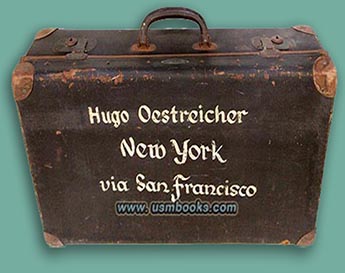The three rare 103 x 148 mm (about 4 x 6 inch) genuine etched postcards in the Oestreicher lot depict the rein-jüdische landwirtschaftliche Siedlung Gross-Gaglow bei Kottbus (Pure Jewish Agricultural Settlement at Gross-Gaglow near Cottbus), a Jewish kibbutz-style settlement near the small eastern German city of Cottbus, that promoted an agricultural lifestyle and was expected to secure the future for young German Jews and their families in Germany in the early 1930s.
That educational farm operation was the brainchild of Martin Gerson who founded the Jüdische Landarbeit GmbH (Jewish Land Work, Inc.) in 1930 with support of the well-organized Reichsbund jüdischer Frontsoldaten (National Association of Jewish Combat Veterans) which had purchased 820 Morgen of land at Gross-Gaglow. In Germany at that time the size of one Morgen was the equivalent of about two acres, and was considered to be the amount of land tillable in the morning (Morgen in German) hours of one day by one man behind an ox or horse pulling a single-share plow. On 21 June 1931, the foundation stone of the first house was laid, inaugurating the plan for Jews who came to the “Pure-Jewish Agricultural Settlement Gross-Gaglow” to get a house and a parcel of land, on which they could work towards 100% ownership.
That educational farm operation was the brainchild of Martin Gerson who founded the Jüdische Landarbeit GmbH (Jewish Land Work, Inc.) in 1930 with support of the well-organized Reichsbund jüdischer Frontsoldaten (National Association of Jewish Combat Veterans) which had purchased 820 Morgen of land at Gross-Gaglow. In Germany at that time the size of one Morgen was the equivalent of about two acres, and was considered to be the amount of land tillable in the morning (Morgen in German) hours of one day by one man behind an ox or horse pulling a single-share plow. On 21 June 1931, the foundation stone of the first house was laid, inaugurating the plan for Jews who came to the “Pure-Jewish Agricultural Settlement Gross-Gaglow” to get a house and a parcel of land, on which they could work towards 100% ownership.
On this USMBOOKS web page, we provide additional information on the Rein-Jüdische Landwirtschaftliche Siedlung Gross-Gaglow bei Kottbus, the "Pure Jewish Agricultural Settlement at Gross-Gaglow near Cottbus".
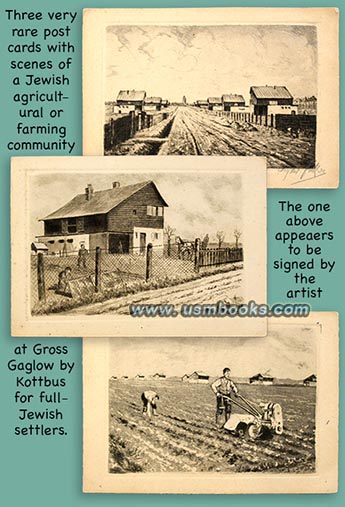
The plan never got far because on 29 September 1933 the new Nazi Reichserbhofgesetz or Hereditary Farm Law came into effect which made it illegal for Jews to own farm land in Germany. The land owned by the Jüdische Landarbeit GmbH and its inhabitants was expropriated and by 1935 all the Jewish settlers had been evicted from the land. The Jewish Agricultural Training Settlement and its cooperative at Groß-Gaglow officially closed on 24 May 1935 and the 30 or so houses and the farm land were in the hands of aryan Germans.
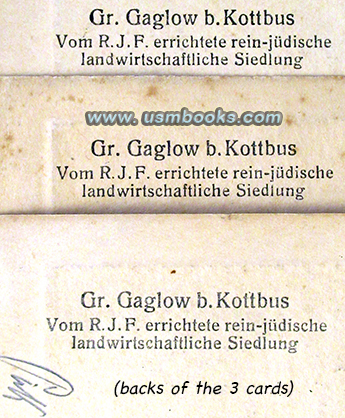
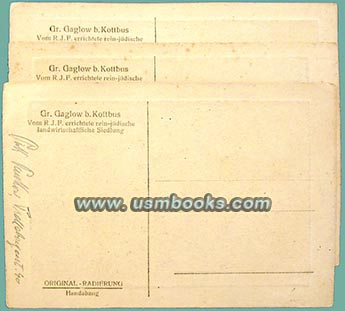
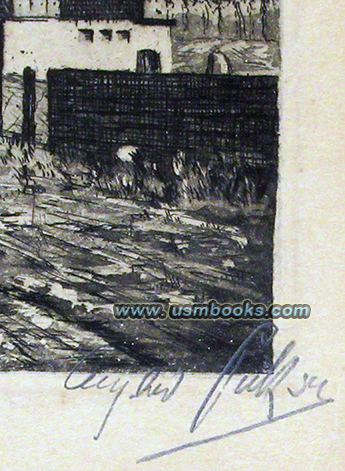
After the closure of the Jewish settlement at Gross-Gaglow, Martin Gerson traveled to Cyprus and Palestine in an unsuccessful attempt to locate land there for the resettlement of the Gross-Gaglow Jews.
One of Martin Gerson’s Jewish agricultural and horticultural learning centers, Landwerk Neuendorf, was located near Berlin. Gerson’s mother-in-law, well-known Montessori teacher Clara Grunwald (who was also raising Gerson’s two young daughters), was a teacher at Landwerk Neuendorf until 1941 when the Jewish agricultural settlement was turned into a Nazi forced labor camp and a consolidation camp for deportations to the East.
In 1942, Martin Gerson, his wife (a garden-architect) and two daughters were deported to the Theresienstadt Ghetto/Concentration Camp (Terezin) in the former Czechoslovakia. There, Gerson was responsible for the parks and gardens until they were deported to the much larger Nazi Concentration Camp at Auschwitz-Birkenau, where they died in the fall of 1944.
One of Martin Gerson’s Jewish agricultural and horticultural learning centers, Landwerk Neuendorf, was located near Berlin. Gerson’s mother-in-law, well-known Montessori teacher Clara Grunwald (who was also raising Gerson’s two young daughters), was a teacher at Landwerk Neuendorf until 1941 when the Jewish agricultural settlement was turned into a Nazi forced labor camp and a consolidation camp for deportations to the East.
In 1942, Martin Gerson, his wife (a garden-architect) and two daughters were deported to the Theresienstadt Ghetto/Concentration Camp (Terezin) in the former Czechoslovakia. There, Gerson was responsible for the parks and gardens until they were deported to the much larger Nazi Concentration Camp at Auschwitz-Birkenau, where they died in the fall of 1944.
Few people anywhere in the 21st century are even remotely aware that there ever was a Jewish agricultural settlement of any kind in Nazi Germany. However, since the reunification of East- and West Germany in 1990 several Jewish families have attempted to reclaim their family property at Groß-Gaglow that had been seized by the German government in 1935. Those legal procedures are ongoing.
Martin Gerson, the man behind the Gross-Gaglow settlement also oversaw other Jewish agricultural and horticultural learning centers in Nazi Germany that promoted the re-education of young Jews in preparation for hoped-for settlement in Palestine. Gerson had a degree in agriculture from the University of Berlin and was at times assisted by his brother Manfred who had received hands-on agricultural experience during time spent in California U.S.A.
Martin Gerson, the man behind the Gross-Gaglow settlement also oversaw other Jewish agricultural and horticultural learning centers in Nazi Germany that promoted the re-education of young Jews in preparation for hoped-for settlement in Palestine. Gerson had a degree in agriculture from the University of Berlin and was at times assisted by his brother Manfred who had received hands-on agricultural experience during time spent in California U.S.A.
RETURN to the main page of the Oestreicher / Warschawski
Jewish refugee 'cache' for sale on USMBOOKS.com.
OESTREICHER / WARSCHAWSKI TREASURE TROVE
|


